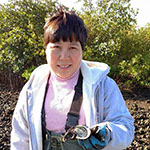As part of a 2018 Sea Grant National Aquaculture Initiative to support the advancement of aquaculture in the U.S., two Florida Sea Grant researchers have been awarded more than $1 million by NOAA Sea Grant for projects in both fish and shellfish farming.
The two research projects that will be funded are:
- Development of Genomic Breeding Tools through Transcriptome Analysis by RNAseq for Sustainability of the Hard Clam Aquaculture Industry
University of Florida Institute of Food and Agricultural Sciences
$356,755 - Final Steps Toward Commercialization of Pompano Aquaculture
Florida Atlantic University Harbor Branch Oceanographic Institute
$701,081
The funding is just a portion of $11 million that NOAA Sea Grant has awarded to 22 projects to further advance the development of sustainable marine and coastal aquaculture in the U.S All projects will be led by Sea Grant programs in the respective states.
The grants were awarded to address specific priorities of a 2018 Sea Grant funding initiative — developing emerging systems or technologies; developing and implementing actionable methods of communicating accurate, science-based information about the benefits and risks of aquaculture; and increasing the resiliency of aquaculture systems to natural hazards and changing conditions. The projects will be conducted over a three-year period and require a 50 percent match by recipients.
One hundred proposals were submitted requesting a total in $48 million in federal grant funds.
“We are excited that these Florida projects were selected for funding by NOAA Sea Grant, because the conditions in our coastal waters are ideal for high productivity of valuable food fish and because we have unmatched expertise in this state to take research-scale marine aquaculture to the commercial level,” said Karl Havens, director of Florida Sea Grant.
Development of Genomic Breeding Tools through Transcriptome Analysis by RNAseq for Sustainability of the Hard Clam Aquaculture Industry
Huiping Yang, University of Florida Department of Fisheries and Aquatic Sciences
 Huiping Yang, Florida Sea Grant aquaculture specialist with the fisheries and aquatic science program at the University of Florida has been awarded $356K to develop genomic breeding tools through transcriptome analysis using RNA sequencing as well as traditional breeding strategies to advance the hard clam aquaculture industry in the eastern U.S. She is collaborating with the Florida hard clam industry on the project.
Huiping Yang, Florida Sea Grant aquaculture specialist with the fisheries and aquatic science program at the University of Florida has been awarded $356K to develop genomic breeding tools through transcriptome analysis using RNA sequencing as well as traditional breeding strategies to advance the hard clam aquaculture industry in the eastern U.S. She is collaborating with the Florida hard clam industry on the project.
Yang says the hard clam industry is entirely reliant on commercial hatchery seed, meaning access to affordable and high-quality seed is crucial to industry success. However, seed production has often fluctuated in quality, and shortages occur almost every year. Currently, no specific strains of broodstock, or a group of mature individuals used for breeding, are developed for hard clam aquaculture despite the economic importance of this marine aquaculture species.
“It is anticipated that this project can serve as an initial action to achieve our long-term goal, which is the production of superior broodstock for high-quality seed production to sustain the hard clam industry and increase the resiliency of shellfish aquaculture systems,” Yang said.
Final Steps Toward Commercialization of Pompano Aquaculture
Paul Wills, Florida Atlantic University Harbor Branch Oceanographic Institute
 Paul Wills, associate director for research at Florida Atlantic University Harbor Branch Oceanographic Institute, has been awarded $701K to overcome the hurdles for the commercialization of Florida pompano, Trachinotus carolinus, in U.S. aquaculture.
Paul Wills, associate director for research at Florida Atlantic University Harbor Branch Oceanographic Institute, has been awarded $701K to overcome the hurdles for the commercialization of Florida pompano, Trachinotus carolinus, in U.S. aquaculture.
“Florida pompano are regarded as the finest marine food fish and command high prices in U.S. fish markets,” Wills said. “Production methods for Florida pompano in marine recirculating aquaculture systems have advanced to the point where viable commercial production looks to be economically sustainable by overcoming a minimal number of remaining hurdles.”
The specific objectives of the project are to use feed additives and new feed manufacturing technology to increase feed efficiency and reduce waste; use prebiotic and probiotic feed additives to improve the nutrient availability, health status and survival of the Florida pompano; and work directly with industry to create a basic business plan and culture manual for commercial production of Florida pompano.
Wills said that as part of the partnership with Florida Sea Grant, his team will also be offering industry workshops to review the business plan and culture manual.
“Our project team will continue to be available after the project ends to help with the industry expansion to ensure the success of the commercialization of Florida pompano aquaculture,” Wills said.
For information about the other projects funded, visit: Sea Grant Announces 2018 Aquaculture Research Awards